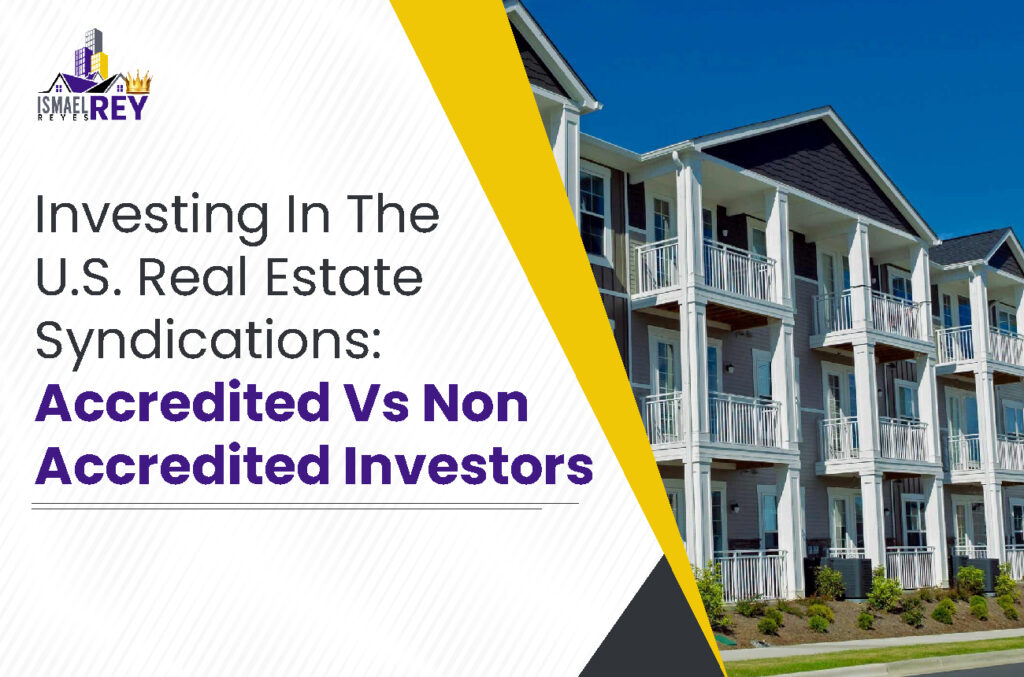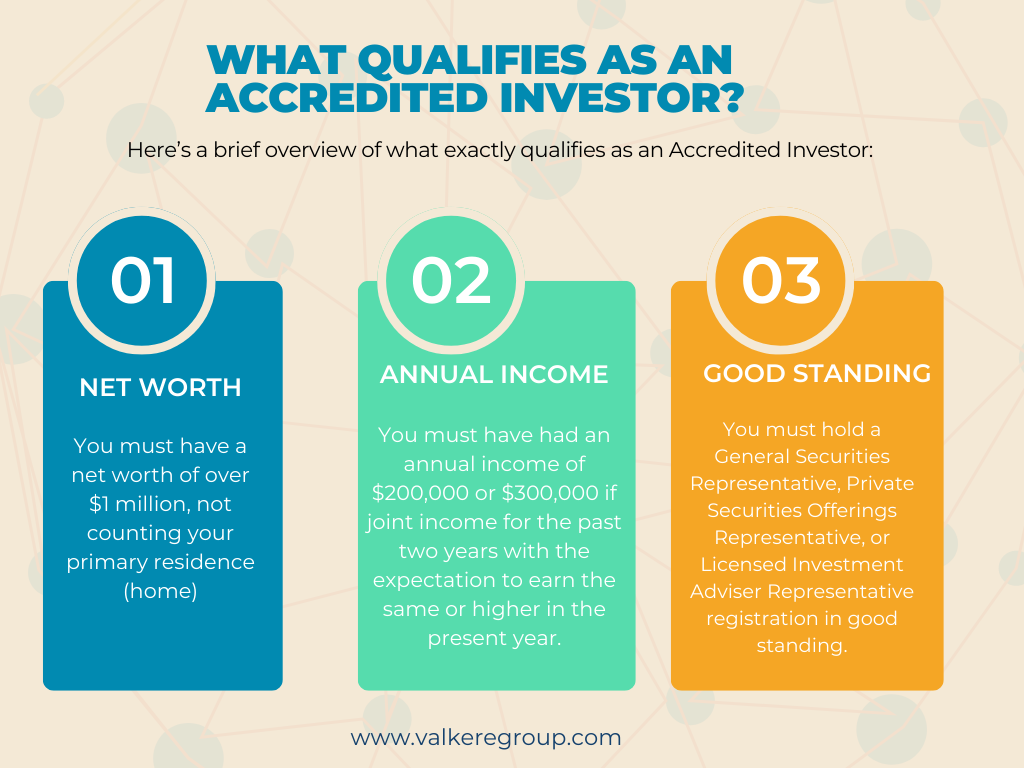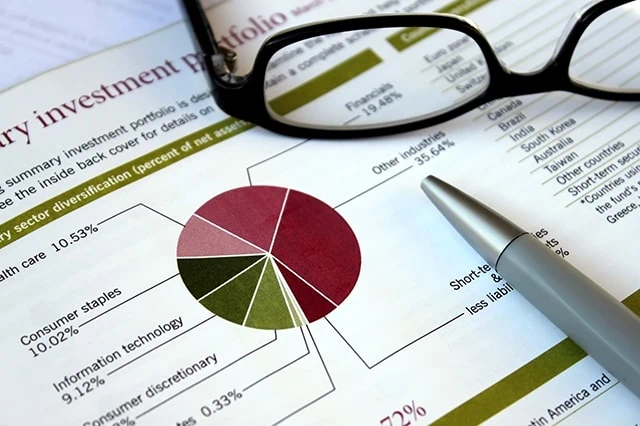All Categories
Featured
Table of Contents
As recognized investors, individuals or entities might partake in private investments that are not registered with the SEC. These investors are presumed to have the economic class and experience needed to examine and purchase risky investment possibilities unattainable to non-accredited retail investors. Right here are a few to think about. In April 2023, Congressman Mike Flooding introduced H (commercial real estate for accredited investors).R
In the meantime, investors need to comply with the term's existing meaning. There is no official process or government qualification to become an accredited financier, an individual might self-certify as an accredited investor under present policies if they earned even more than $200,000 (or $300,000 with a spouse) in each of the past two years and anticipate the same for the current year.
People with an active Series 7, 65, or 82 license are also considered to be accredited investors. Entities such as corporations, collaborations, and trust funds can additionally achieve accredited investor standing if their investments are valued at over $5 million. As recognized investors, individuals or entities may participate in personal financial investments that are not registered with the SEC.
Below are a couple of to take into consideration. Personal Equity (PE) funds have actually shown amazing development in the last few years, seemingly undeterred by macroeconomic challenges. In the third quarter of 2023, PE deal quantity surpassed $100 billion, about on the same level with deal task in Q3 of the previous. PE companies swimming pool capital from certified and institutional financiers to get regulating passions in fully grown personal firms.
Along with funding, angel capitalists bring their expert networks, guidance, and proficiency to the startups they back, with the assumption of venture capital-like returns if business takes off. According to the Facility for Endeavor Study, the typical angel investment quantity in 2022 was about $350,000, with capitalists obtaining an ordinary equity stake of over 9%.
Exclusive High Yield Investments For Accredited Investors
That said, the development of on-line personal credit platforms and particular niche enrollers has made the property class available to private recognized capitalists. Today, capitalists with as low as $500 to spend can capitalize on asset-based private credit report possibilities, which use IRRs of up to 12%. In spite of the rise of shopping, physical food store still make up over 80% of grocery store sales in the United States, making themand especially the realty they operate out oflucrative investments for certified capitalists.
In contrast, unanchored strip centers and neighborhood centers, the next 2 most heavily negotiated sorts of realty, videotaped $2.6 billion and $1.7 billion in purchases, specifically, over the very same period. What are grocery store-anchored? Suburban shopping center, electrical outlet shopping centers, and various other retail centers that include a major food store as the location's main lessee commonly drop under this classification, although shopping centers with encased sidewalks do not.
To a lesser degree, this phenomenon is additionally real backwards. This distinctly cooperative connection between a facility's occupants increases need and maintains rental fees elevated. Approved capitalists can purchase these areas by partnering with property private equity (REPE) funds. Minimum investments generally begin at $50,000, while complete (levered) returns range from 12% to 18%.
Specialist Tax-advantaged Investments For Accredited Investors

Over the last years, art has actually made average yearly returns of 14%, trouncing the S&P 500's 10.15%. The marketplace for art is additionally expanding. In 2022, the international art market grew by 3% to $67.8 billion. By the end of the decade, this figure is anticipated to approach $100 billion.
Capitalists can currently possess varied private art funds or acquisition art on a fractional basis. accredited investor income opportunities. These options come with investment minimums of $10,000 and provide web annualized returns of over 12%.

Over the previous a number of years, the recognized investor interpretation has been slammed on the basis that its sole focus on an asset/income test has unfairly excluded all but the richest people from financially rewarding investment possibilities. In action, the SEC began considering ways to increase this meaning. After a considerable remark period, the SEC adopted these amendments as a way both to catch individuals that have reputable, alternative signs of financial elegance and to modernize specific out-of-date parts of the definition.
The SEC's key problem in its policy of non listed securities offerings is the security of those investors that do not have a sufficient degree of economic sophistication. This concern does not apply to knowledgeable employees due to the fact that, by the nature of their placement, they have enough experience and accessibility to economic info to make enlightened investment choices.
High-Quality Best Crowdfunding Sites For Accredited Investors Near Me
The figuring out variable is whether a non-executive staff member in fact joins the personal investment business's investments, which should be figured out on a case-by-case basis. The addition of experienced workers to the accredited investor interpretation will certainly also allow even more staff members to spend in their employer without the exclusive investment firm risking its own standing as a recognized financier.
Prior to the changes, some exclusive investment firm took the chance of losing their accredited capitalist standing if they allowed their employees to purchase the firm's offerings. Under the changed meaning, a better number of private investment firm employees will now be eligible to invest. This not just creates an added resource of funding for the exclusive investment firm, yet likewise further lines up the interests of the employee with their company.
Quality Tax-advantaged Investments For Accredited Investors – Oklahoma City
Currently, just people holding specific broker or financial expert licenses ("Series 7, Series 65, and Collection 82") qualify under the definition, however the modifications approve the SEC the capability to include added certifications, classifications, or credentials in the future. Certain sorts of entities have additionally been included to the meaning.
When the definition was last upgraded in 1989, LLCs were relatively rare and were not included as an eligible entity. Under the changes, an LLC is considered an accredited capitalist when (i) it has at the very least $5,000,000 in properties and (ii) it has not been developed entirely for the particular objective of acquiring the safeties used.

Similarly, certain family members offices and their clients have actually been included in the interpretation. A "household office" is an entity that is established by a family members to manage its assets and attend to its future. To guarantee that these entities are covered by the meaning, the changes state that a household office will certainly now qualify as an approved investor when it (i) takes care of a minimum of $5,000,000 in possessions, (ii) has not been created specifically for the purpose of getting the provided safeties, and (iii) is guided by a person who has the financial sophistication to review the benefits and threats of the offering.
The SEC asked for comments concerning whether the monetary thresholds for the earnings and property tests in the interpretation should be readjusted. These thresholds have actually been in location considering that 1982 and have actually not been gotten used to represent rising cost of living or various other elements that have changed in the stepping in 38 years. The SEC inevitably made a decision to leave the property and income limits unchanged for currently (real estate investing for accredited investors).
Latest Posts
Delinquent Real Property
Investing In Tax Lien Certificates Online
Real Estate Tax Lien Investments For Tax Advantaged Returns